Finance Therapy Circle - but make it Uncharitable! We’ll be joined by the Earth Justice Consultant and Funding and Non-profit pro, Natalie Armitage.
We’ll be making space for impact, charity and non-profit workers that have been given politically charged tasks, whilst experiencing burnout whilst working towards a “cause”. We’re talking worth, value and coverups. 25th March, 5.30pm GMT.
Looking for a holistic financial wellbeing specialist? Lucky you, as I’ve got some capacity for Mid-March onwards! I’ve had a blast these last few weeks delivering collabs, events and speaking on all things our relationship to money, mental health, burnout, the emotional side of money and wealth building. I’m looking to work with values aligned businesses and brands to bring financial healing to their employees, customers and communities. Get in touch for some No-BS, authentic money chat.
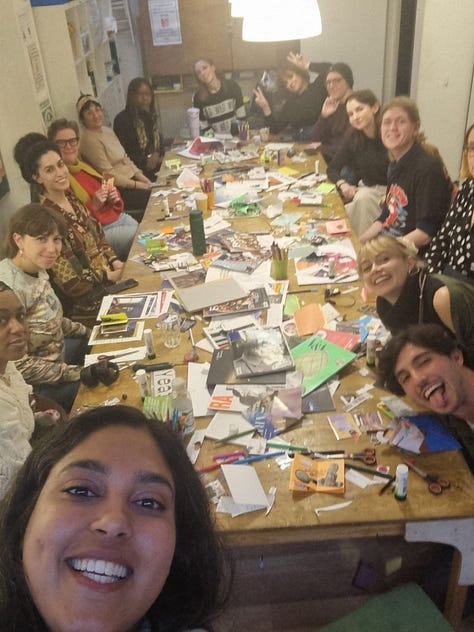

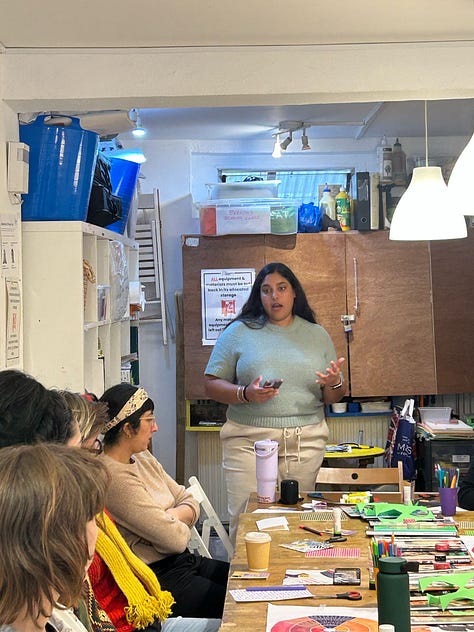
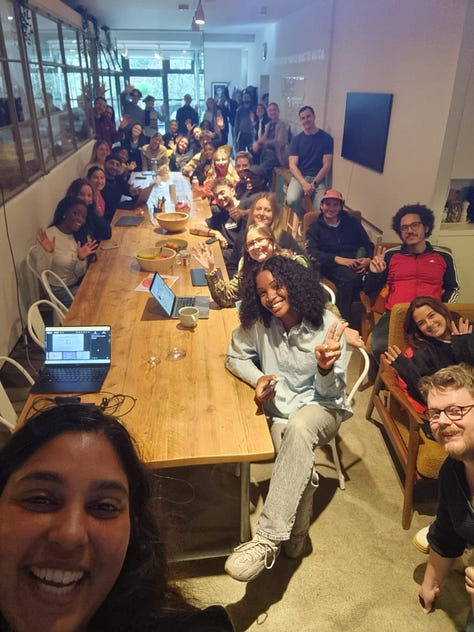
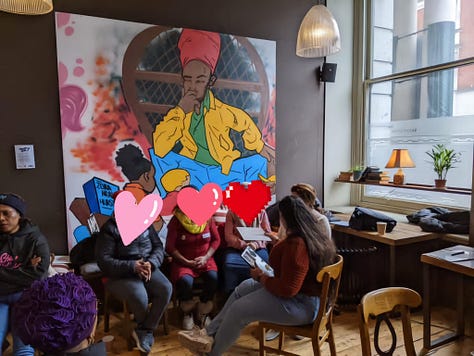
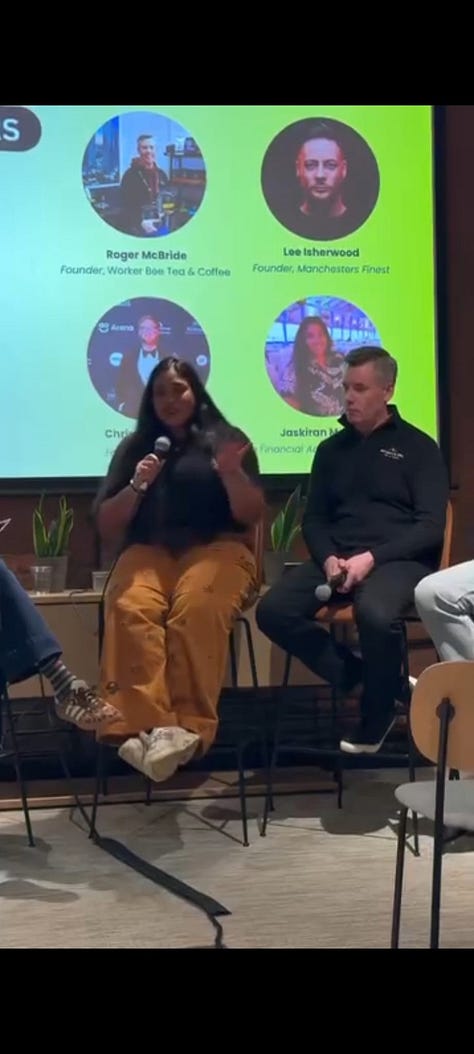
a few snaps from this past week spreading financial wellbeing around London and manchester
A year ago I wrote a piece about the words expat and immigrant and their impact on our identity and finances. A year on, these themes feel more important and heavier than before. It seems everyone is an “other” and the narratives around the squeeze on resources, individualism, and immigration are getting louder.
The good news is that humans are actually doing better than we ever have before. The bad news is, for most, it certainly doesn’t feel like it.
In fact, it feels like the world is on fire right now, and it’s getting harder to ignore. Whether you’re watching the Tate brothers released from house arrest in Romania to the US - where the price of eggs is rising exponentially, but the president seems more concerned with empowering violent criminals. Or being 16 months into watching ethnic cleansing live streamed to our phones, whilst UK documentaries platform bigoted Brits, who believe we have no responsibility for refugees from war-torn countries.
So how have the powers that be managed to convince voters that the poorest 1% of our population are responsible for our falling living standards in the west?
Who gets to be an immigrant?
In a Trump world, I see more content than ever geared towards helping wealthy, white Americans escape the Trump administration by taking up the coveted “Citizen of the World” status.
“How to become a global expat” and “The 10 best places to go to escape the US” are just some of the popular videos circulating on social media. This narrative does more harm than good. Firstly, no one actually wants you in their country driving up prices for locals, imposing your privileged western views and entitlement onto them - ‘Gringo’s go home’. Secondly, those most disproportionately affected by far-right policy, are often those in essential roles and can’t afford to leave to work from their laptop on a beach. They are stuck in the political environment you voted for, fighting for the rights of the oppressed and making ends meet where they can. They don’t get to leave, why should you?
Yet, we continue to let the number in our bank account and the colour of our skin determine who is a good immigrant and who is a bad one. Expats are to be praised as brave, trailblazing adventurers - looking to live an extraordinary life, learning about culture whilst posting stories online about their idyllic global lifestyle.
Whilst refugees, asylum seekers, migrant workers and economic immigrants are demonised as lazy and opportunistic leeches, coming here to steal our jobs, claim our benefits and take over our public services. Meanwhile, they're actually contributing something to the economies they move to, beyond purchasing a mojito at a beach club and paying rent to wealthy (mostly immigrant) Airbnb owners.
I said what I said.
The scarcity machine
Good news doesn’t make good headlines. And the media needs good headlines to make - you guessed it - good money. Governments and media outlets have successfully weaponised our innate ‘negativity bias’ to turn some of the most vulnerable people in society into villains, painting immigrants as economic burdens. We love an attention grabbing, drama filled Newsnight - we use it for social bonding and we’re much more likely to remember the bad news due to the way our brains process negative information more deeply.
We’re also governed by emotions before logic. So naturally, we’re fed rage bait statistics about our own economic position, whilst using dehumanising language - “Illegals” - to make it easier to blame immigrants for economic struggles, failing public services, and the housing crisis. Meanwhile, the top 1% have grown their wealth faster than ever, hoarding resources, lobbying for tax cuts, and widening economic inequality with barely any public backlash.
This isn't accidental. It's a feature of a system designed to keep people looking in the wrong direction. Fuelled by a feeling of scarcity - even when such scarcity does not exist (cue the rich people who have never wanted for anything crying about the lack of space in our country for refugees). If the working and middle classes are busy blaming migrants for economic instability, they won't focus on the fact that the super wealthy are buying up all of their resources and making it unaffordable for them to ever own assets and achieve financial freedom.
Please, Don’t Start Thinking
By instilling a sense of scarcity and creating a public enemy in the poorest 1% of our population (illegal migrants), we plunge our population into survival mode. When we struggle financially, we make poor decisions. We lose capacity for critical thinking. We do what we can to get by. Lucky for us, we’ll be told what to think, and hopefully we’ll be too tired to question it.
The truth is, the people most responsible for economic hardship are the ones making record profits while paying next to nothing in taxes. For instance, Amazon's corporation tax avoidance could have cost UK citizens around £433 million in lost taxes in 2023 alone. Yet, you'll rarely see a prime-time debate about closing tax loopholes with the same energy that's given to cracking down on asylum seekers.
The billionaire class and the corporations they own fund think tanks and media outlets that push anti-immigrant narratives, ensuring public anger is aimed downward, not upward. Policies that 'crack down' on immigration benefit big businesses too - prisons, surveillance contracts, and exploitative labour practices all create profitable industries off the suffering of displaced people.
So next time you go simping for the billionaires - remember, there is no ethical billionaire, and somewhere down the line they’ve stood on your head to get where they are today.
Go back to where you came from
Immigrants - both legal and illegal - take up jobs in industries where there are shortages, from agriculture to healthcare. They pay taxes, contribute to local economies, and in many cases, receive fewer benefits than native-born citizens. A recent report by the UK's Migration Advisory Committee reveals that migrants on skilled worker visas contribute significantly more to public finances compared to British workers. In 22/23, skilled migrants each made a net contribution of £16,300, whereas UK-born working adults contributed around £14,400.
The idea that immigrants are 'taking' anything is a carefully curated lie, used to deflect from the policies that have led to wage stagnation, high living costs, and a dismantled welfare system.
You may argue that this country welcomes skilled workers, it’s the ones risking their lives on boats that are the problematic leeches. Well, those immigrants are skilled too, they come here to flee war and devastation often started by and left by the west. It was less than 100 years ago that this ‘little island which has no more space’ had control of one of the biggest ‘empires’ in history - stealing land and resources, using the people to fight and win its wars, and then bringing them over here to rebuild said ‘little island’.
The thing is, the average Joe walking down the street can’t determine the difference between an illegal immigrant and a legitimate one (nor does he care). So, if your skin or features look slightly more than off-white, you’ve no doubt had the words “go back to where you came from” shouted at you on the wonderful streets of Britain once or twice in your life.
Why We Keep Falling for It
There's something psychologically comforting about having an enemy. If things are getting worse, we want a clear cause. And governments, backed by billionaire-owned media, are happy to provide one: immigrants, benefit claimants, people on strike. Blaming the rich, however, is inconvenient, it requires looking at an economic system that benefits those in power and demands structural change.
We complain that we were never taught financial literacy in school - but how often do we question why? How different would our political debates and elections be if we were taught, from an early age, to question where power really sits. To ask why there is always money for corporate tax cuts but not for hospitals. To recognise when we're being manipulated into fighting amongst ourselves instead of uniting against the real source of economic injustice.
What Happens When We Stop Falling for It?
They want you to believe that the hand asking for help is the one stealing your food, so you never find the truth. They want you to feel powerless. They want you to think that change isn’t possible unless we combat this “common enemy”.
What would happen if we refused to buy into this manufactured blame? If we shifted the conversation away from the people at the bottom of the economic ladder and started holding those at the top accountable?
We'd demand higher taxes on wealth instead of tougher borders. We'd fight for better wages rather than blaming migrants for low pay. We'd see through the lie that there's not enough to go around - when in reality, the problem isn't scarcity, it's hoarding.
Next time someone tells you immigrants are the problem, ask them who really profits from that belief. Ask them whose interests are served by keeping people distracted. And then, start shifting the conversation to where it belongs.




